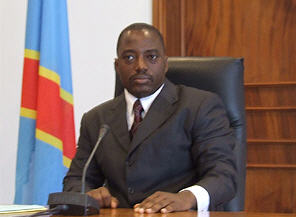
The joint military operation by the Democratic Republic of Congo (DRC) and Rwanda to dislodge armed militias from North Kivu Province has prompted an increase in combatants willing to be repatriated, President Joseph Kabila said.
"The good news is that since the start of the operation in North Kivu there are now over 1,200 FDLR [Forces democratiques pour la liberation du Rwanda] combatants who are to return to Rwanda," Kabila told reporters in Kinshasa on 31 January.
The UN Mission in DRC (MONUC) is not taking part in the military operations but has promised support for the voluntary repatriation of combatants through a disarmament, demobilisation, repatriation and reintegration (DDRR) programme launched in 2002.
In January, at least 200 combatants were repatriated, said Bruno Donnat, the MONUC DDRR officer on 2 February. The figure is an increase on the 70 who were repatriated over a similar period in January 2008.
MONUC had set up five centres to support those wishing to be repatriated.
Kabila said there were an estimated 5,000 combatants in North Kivu Province, among them different armed groups including the FDLR, which contains militias including some who participated in the 1994 Rwandan genocide.
FDLR stronghold overrun
The operation started on 20 January. Last week, the two armies said they had seized control of Munzenze, a former FDLR stronghold. The locality is in Virunga National Park in Rutshuru.
At least 83 guns as well as a large quantity of different calibres of ammunition were also recovered, they said in a 31 January communiqué.
Since the start of the operation, said a spokesman, Capt Olivier Hamuli, an estimated 20 Hutu Rwandan combatants, mainly from the FDLR, had been killed.
"The result should be, in my humble opinion, the return of peace and stability in the province of North Kivu and the start of the reconstruction of the two Kivu provinces," Kabila said.
Campaign against LRA
The joint operation against Hutu combatants as well as one against Lord's Resistance Army (LRA) rebels, which is being carried out jointly with the Ugandan and southern Sudanese army in the northeast, "should not go beyond the month of February," he said.
The LRA is active in parts of northeastern DRC. It recently launched attacks against civilians, killing hundreds, according to Human Rights Watch.
ICC
Asked about demands by human rights organisations that Bosco Ntaganda, the leader of the Congrès national pour la défense du peuple (CNDP) movement, be handed over to the International Criminal Court (ICC) to face war crimes, the president said he preferred to ensure peace and stability in the east.
The ICC has indicted Ntaganda for crimes committed in the northeastern district of Ituri.
"The option is whether to hand him over... or peace and security for our population in the east. For me the choice is clear... the option for us is the stability, the security of our population," Kabila said.
Kabila, however, said Laurent Nkunda, former CNDP leader, should be brought back to the DRC. Nkunda was arrested in Rwanda on 22 January, days after the launch of the operation against Rwandan Hutu militia.
According to the government, the CNDP has agreed to disband some members expected to be integrated into the army. The group has also verbally agreed to release all children in its ranks, according to the UN Children's Fund.
Related articles
- • UN Security Council Calls on Rwanda to Stop Supporting M23 Rebels in DR Congo (February 22, 2025)
- • 'Deadly environment' plus 'political and social' obstacles hinder Ebola fight, Security Council hears (July 24, 2019)
- • Ebola outbreak declared an international Public Health Emergency (July 17, 2019)
- • Felix Tshisekedi Sworn In as DR Congo President (January 24, 2019)
- • Constitutional Court Declares Tshisekedi Winner of Presidential Election (January 19, 2019)
- • Felix Tshisekedi Vows to Be the President of All Congolese (January 10, 2019)
- • Felix Tshisekedi Elected DR Congo President (January 10, 2019)
- • DR Congo Delays Results of December Election (January 6, 2019)
- • At least 30 dead after massacres in Ituri (March 2, 2018)
- • Botswana Urges Joseph Kabila to Step Down (February 26, 2018)
- • No elections in DR Congo in December without electronic voting machines: INEC (February 13, 2018)
- • US Warns DR Congo Against Electronic Voting for Delayed Election (February 12, 2018)
- • Felix Tshisekedi accuses INEC of illegally prolonging Kabila's mandate (October 24, 2017)
- • DRC Seeks Arrest of Presidential Candidate Moise Katumbi (May 19, 2016)
- • Papa Wemba Is Buried in Kinshasa (May 4, 2016)
- • Papa Wemba Awarded Highest National Honor as Thousands Pay Tribute (May 2, 2016)
- • Peacekeepers, Congo Army to Resume Joint Fight Against Rwandan Rebels (January 28, 2016)
- • Political tensions 'running high' in DR Congo ahead of 2016 elections (October 7, 2015)
- • Rights Groups: DR Congo Must Free Pro-democracy Activists (April 13, 2015)
- • DRC Army Putting Pressure on FDLR (April 1, 2015)
- • Police Open Fire on Crowd Protesting Election Law Change (January 19, 2015)
- • ICC Confirms 14-Year Sentence Against Thomas Lubanga (December 1, 2014)
- • Etienne Tshisekedi Evacuated to Belgium for Medical Treatment (August 16, 2014)
- • Southern African Leaders to Meet in Zimbabwe (August 15, 2014)
- • ICC confirms war crimes charges against Bosco Ntaganda (June 10, 2014)
- • ICC sentences Germain Katanga to 12 years (May 23, 2014)
- • Kerry Calls on Kabila to Honor Constitution (May 4, 2014)
- • Kerry in DR Congo for Security Talks (May 3, 2014)
- • Security Council extends UN mission, intervention force in DR Congo for one year (March 28, 2014)
- • U.S. sending more personnel to Uganda to hunt LRA leader Joseph Kony (March 24, 2014)







